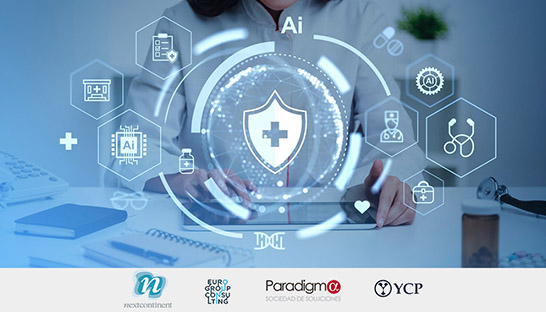
The global healthcare sector is being revolutionized by a variety of technologies, benefiting patient care, health diagnostics, operational efficiency, research and development, and innovation. Experts from Nextcontinent and its three member companies outline nine technologies that hold great promise in the coming years.
big data
Analyze large data sets to identify trends, patterns, and relationships.
Patient data analysis: Analyze large amounts of patient data to identify patterns and trends that can help improve disease diagnosis and treatment.
• Risk prediction: Predict a patient's risk of disease and provide personalized analysis.
• Develop new medical devices: Develop new medical devices that help improve patient care.
AI and ML
AI-driven algorithms analyze data to identify patterns, predict outcomes, and make decisions.
Disease diagnosis: Analyze patient data to identify patterns and help doctors diagnose diseases more accurately.
• Personalization of treatment: Individualize treatment based on the patient's individual characteristics.
• New drug development: Identify new molecules and develop new drugs faster and more efficiently.
Learn more: 6 areas where AI is bringing significant value to healthcare.
internet of things
Sensors and devices collect data and send it to a central platform for analysis.
Patient Monitoring: Collect real-time patient data to enable remote health monitoring and early detection of problems.
• Medication Management: Help patients take their medications safely and on time.
• Improve hospital efficiency: Automate tasks such as medical equipment inventory and location tracking.
• Predictive maintenance and equipment collaboration: Enhance equipment maintenance and connectivity through predictive insights and augmented reality.
robotics
Human-controlled or programmed robots perform specific tasks.
Robotic surgery: Allows for more precise and less invasive surgery, reducing patient recovery time.
• Rehabilitation: Helping patients regain mobility and muscle function after injury or surgery.
• Elderly Care: Caring for the elderly and disabled, providing assistance and companionship with daily living.
• Production process and quality control: Enhance your workflow and maintain quality with automatic monitoring.
chatbot
Conversational interfaces employ natural language to interact with users.
Patient Care: Can be used to keep patients informed and supported 24/7.
• Appointment Scheduling: Helps patients schedule appointments with their doctors.
• Patient monitoring: Can be used to track patient progress after surgery or medical procedures.
wearable
Wearable devices monitor users' biometric data and physical activity.
Health monitoring: Monitor patient health status in real time, including heart rate, blood pressure, and physical activity.
• Early detection of diseases: Health problems such as heart arrhythmia and sleep apnea can be detected early.
• Motivating physical activity: Can motivate people to be more physically active.
virtual reality
Simulated environment for training, rehabilitation and treatment.
Medical training: VR can be used to train doctors who perform surgical procedures.
• Patient rehabilitation: VR helps patients recover from injuries and illnesses.
• Pain treatment: VR can also distract patients from pain and help them relax.
• Remote support maintenance and training: VR enables real-time interactive guidance and training for technicians and support staff.
disease prediction
Analysis of genetic and lifestyle data to predict disease risk.
Genetic data analysis: A patient's genetic data can be analyzed to identify predispositions to specific diseases.
• Lifestyle data analysis: A patient's lifestyle data, such as diet and physical activity, can be used to predict the risk of developing a disease.
• Early intervention: Disease prediction enables early intervention and prevention of chronic diseases.
health check
Tests to assess your overall health and identify your risk of disease.
Health Assessment: Health tests can be used to assess an individual's health status and uncover potential health risks.
• Disease prevention: Wellness testing helps prevent disease by identifying health problems early.
• Health promotion: Wellness testing promotes a healthier lifestyle by helping individuals develop better habits.
In summary, in the rapidly evolving healthcare field, technology solutions are essential to support advancements in care, operations, and experiences. From robust data analytics platforms to innovative telemedicine applications, these innovations provide the foundation for medical development, enabling improvements in patient care, diagnostic accuracy, and efficiency of healthcare processes.
The nine trends were drafted by Nextcontinent, a global consulting network, with thought leadership from Eurogroup Consulting, Paradigma and YCP.

